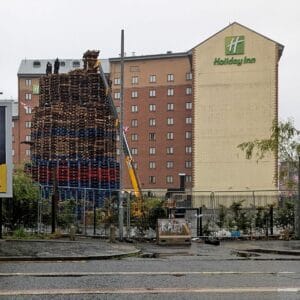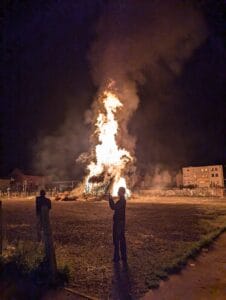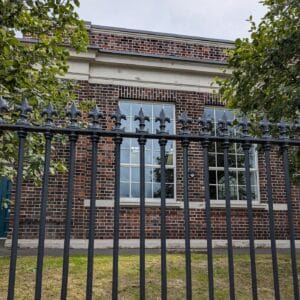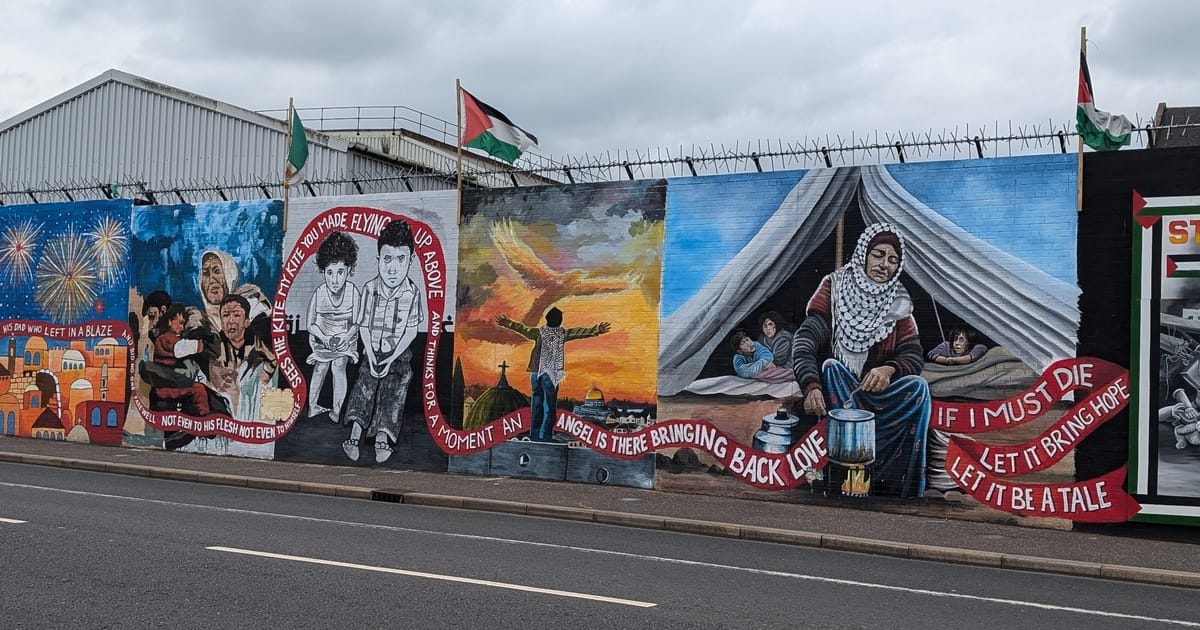Residential Cruising means full-time travel, and I knew I’d learn things and get new perspectives from travel, which is A Good Thing. That started before we even boarded our ship.
We’ve spent weeks in Northern Ireland due to unexpected and unavoidable delays, as discussed earlier. After stints in several hotels, and three weeks in the Canary Islands, we returned to Belfast, this time to an actual apartment in a residential area, where we’ve spent a couple of weeks and have a week or more to go.
Sitting still means catching up a little on work, but also some time to sit and think and reflect. During that time there was an event that caused what Kit likes to call my “synthesis” — gathering up little bits of information and connecting them into something I can write about.
Synthesis
The event is the commemoration of the Battle of the Boyne, fought across the River Boyne near Drogheda in the Kingdom of Ireland (today in the Republic of Ireland), between the forces of the deposed King James II, and those of King William III, who had claimed the Crowns of England and Scotland. James, of course, was fighting to regain the throne, but William won out, which “aided in ensuring the continued Protestant ascendancy in Ireland,” Wikipedia says, emphasis added.

Ah. Sound familiar? Let me add some more flavor. “The conflict had broader and deeper European geopolitical roots, of the League of Augsburg and the Grand Alliance against the expansionist ambitions of Catholic Louis XIV of France,” Wikipedia continues (emphasis added). Protestant vs. Catholic. Yes, it was more than that (“deeper European geopolitical roots”).
On the “Eleventh Night” (11 July), the celebrations of the battle begin with midnight bonfires (Wikipedia: “The reason they use bonfires to symbolize the event dates back to the pagan celebrations of Midsummer, Bealtaine and Samhain, where fire is used as a symbol of celebration.”)
The thing is, that war began on 1 July 1690 (“Old Style” date) — they’re still celebrating a battle most of humanity has never heard of three-and-a-third centuries later. Why? Because, it seems to me, the war is still being fought.
Enter “The Troubles”, which Wikipedia summarizes as “an ethno-nationalist conflict in Northern Ireland that lasted for about 30 years from the late 1960s to 1998.” Protestant vs. Catholic. Yes, it was more than that (“ethno-nationalist conflict”).
Not Just Ireland, By Far
I’m not saying there’s anything “weird” about all of this. After all, what is the Number-One Holiday celebrated in more countries than any other? Not Christmas (the usual guess when I pose that as a question in conversation), but Independence from Britain. The U.S. does a bang-up job of that every July 4, even two-and-a-half centuries after the fact.
And the U.S. has its own civil war. That isn’t Protestant vs. Catholic, but rather about “state’s rights” — the “right” to own and exploit other human beings — vs. abolitionist states. The first time Kit and I traveled to the deep south, it seemed to me that war is still being fought. If I wasn’t sure about that feeling then, I sure am now, which is why I use the present tense.
Back to Ireland
Kit and I were in Belfast five years ago, and we hired a tour guide to give us a personal taxi tour of The Troubles since we knew we didn’t really understand what the issues were. We learned quite a bit in that hour from that guide, but we left knowing we still didn’t really understand what the real issues were …and are.
So this year, with plenty of time on our hands, we took a much more in-depth walking tour of The Troubles, this time three times as long and with two guides: one who fought with the IRA (the Catholic side), and one who fought with the Loyalists (the Protestant side). We learned more, and got a much better understanding of what drove each side — but we are both quite sure that we still don’t understand it all.
Kit and I both came away with the feeling that the Catholic guide talked mostly of the past, while the Protestant guide was driven by his still-existing rage, so much so that he said that if the hot war flared up again, he’d go right back to making bombs …which was interesting, considering he fought in the British Army. The soldiers made improvised explosives?! Or was he moonlighting on the side? I was so struck that I asked him if he had any Catholic friends. None, he said.
And just last night I saw a local news headline: “Catholics Outnumber Protestants in Employment for the First Time, Report Says”. It took quite a while to turn that job discrimination around fully. (Catholics also outnumber Protestants in population.)
The Troubles, by the way, are not to be confused with a similar conflict. “The Troubles of the 1920s was a period of conflict in what is now Northern Ireland from June 1920 until June 1922, during and after the Irish War of Independence and the partition of Ireland. It was mainly a communal conflict between Protestant unionists, who wanted to remain part of the United Kingdom, and Catholic Irish nationalists, who backed Irish independence.” (Wikipedia) These things often don’t stay settled once they’re “over.”
While Writing This

Last night there was a tiny bonfire about a block and a half away. We walked over to see it. “Tiny” in this case means about a 30-foot stack of shipping pallets, but of course the flames were licking much higher into the air. A hundred feet away the heat was pretty intense.
There was a bit of unease expressed by other ship residents on our closed discussion groups. Some worried about violence, and indeed I saw a news report of “IRA graffiti” in Protestant areas — and there is definitely quite a bit of graffiti just blocks from us, though I can’t tell “IRA” from “kids expressing themselves.”
We didn’t feel threatened: the energy in the air didn’t sound or feel dangerous. Still, it’s not our celebration: we took a few photos and headed back to inside the brick walls and iron entry gates of our building. For well past midnight, there were a lot of people in the streets, including kids. I briefly spoke to one girl, around 10, taking pictures of the same fire I was.
And today, during the Twelfth Day, we woke up to hear marching bands in parade after parade — fife and drums — going by for hours and, once that was over, many loud shouts of, what? Anger? Glee? Can’t tell, but there’s a lot of energy out there.
The passions, positive, negative, or both, are high.
Oh! The marching bands are back.
It’s About Rights
As usual, both sides talk about rights. In our recent Troubles Tour, the IRA (Catholic) guide told us that the Catholics suffered overt discrimination: job listings in newspapers, for instance, openly stated “No Catholics Need Apply”. Protestants were the property owners, and the politicians. When things really started getting hot and the British Army was brought in, he said, the Catholics thought they were finally going to get some protection against attacks by The Other Side.

It didn’t happen that way, he said. Instead, once the army started shooting, it was at the Catholics. The first to die was a young boy sleeping in his bed. The second happened to be a British Army soldier on leave — essentially, a victim of friendly fire — but he was not counted by the Loyalists as a casualty of war.
All they really wanted, he said, was the right to work in good jobs. The right to vote. The right to be represented in government by people with their interests in mind — other Catholics.
The Protestant guide said they were merely minding their own business when these IRA guys started planting bombs in shops and pubs, murdering innocent civilians going about their daily lives. They just wanted the right to live in peace. He didn’t say anything about the repression of the Catholics’ rights, just like the Confederates don’t really say anything about the repression of slaves’ rights (but it would be way too simplistic to say the two are truly parallel issues: just examples).

More Rights
We all want our rights. Specifically, our rights and, typically to hell with (or total ignorance of) the other side. What most seem to not understand is it can’t just be one religion who has rights. It can’t just be one race who has rights. It can’t just be one nation that has rights. As long as one group has rights at the expense of others, then none of us really have full and unfettered rights: they’re all subject to the whims of those enforcing those rights.
“We hold these truths to be self-evident, that all men are created equal, that they are endowed by their Creator with certain unalienable Rights, that among these are Life, Liberty and the pursuit of Happiness,” wrote Thomas Jefferson in the United States Declaration of Independence. “That to secure these rights, Governments are instituted among Men, deriving their just powers from the consent of the governed….”
Yet Jefferson was not only a slave owner, he made the conscious decision to not free his slaves in his Will when he died, as was common among the slave-owning noblemen of the time.
Freedom… rights… for who? It’s really either all or none, yet few want to admit that.
“I mean, please, we can, we can get along here?” urged that modern urban philosopher, Rodney King, who was nearly beaten to death by police in Los Angeles for the crime of running from the cops while drunk driving (nope: not an angel). “We all can get along. We just gotta. We gotta. I mean, we’re all stuck here for a while. Let’s, you know, let’s try to work it out. Let’s try to beat it, you know. Let’s try to work it out.”
For everyone.
At least, that’s the synthesis what’s running through my mind the past few days.
Originally Published July 12, 2024 — Last Updated September 4, 2024

Royal Navy, Royal Air Force, but British Army (rather than Royal Army).
—
Thank you! Corrected. (I’m sure he said it right, just my own misunderstanding.) -rc
Well done! You can use the same thoughts and actions for most conflicts in human history.
Various organizations have brought teenagers from conflicting backgrounds (Catholics and Protestants from Northern Ireland, Arabs and Israelis, etc.) into a neutral setting, and they’ve learned to respect each other and become friends but admit that they can’t be friendly to each other when they return home.
“Travel is fatal to prejudice, bigotry, and narrow-mindedness, and many of our people need it sorely on these accounts. Broad, wholesome, charitable views of men and things cannot be acquired by vegetating in one little corner of the earth all one’s lifetime.”
—Mark Twain, The Innocents Abroad / Roughing It
—
Indeed I was leaving it to the reader to see how it all applied pretty universally. 🙂 -rc
Astonishingly honest and insightful.
—
Well, my dear, it IS me! 🙂 -rc
In U.S. politics I consider myself a pretty far right conservative (but not a radical in that regard). Still, I am often confused when peers would happily deny free speech, etc. and rights they demand from those with whom we both disagree. It doesn’t make sense to me. It still baffles me today when liberals (those on the political left) act in ways to prevent hearing or seeing views from the other side. Really? If we can’t dialog, if we can’t disagree without fear, what’s left? Violence?
—
Indeed you see the problem. It’s sad so many do not. -rc
If you had written,
𝘐𝘵 𝘴𝘵𝘪𝘭𝘭 𝘣𝘢𝘧𝘧𝘭𝘦𝘴 𝘮𝘦 𝘵𝘰𝘥𝘢𝘺 𝘸𝘩𝘦𝘯 𝘭𝘪𝘣𝘦𝘳𝘢𝘭𝘴 (𝘵𝘩𝘰𝘴𝘦 𝘰𝘯 𝘵𝘩𝘦 𝘱𝘰𝘭𝘪𝘵𝘪𝘤𝘢𝘭 𝘭𝘦𝘧𝘵) 𝘢𝘯𝘥 𝘤𝘰𝘯𝘴𝘦𝘳𝘷𝘢𝘵𝘪𝘷𝘦𝘴 (𝘵𝘩𝘰𝘴𝘦 𝘰𝘯 𝘵𝘩𝘦 𝘱𝘰𝘭𝘪𝘵𝘪𝘤𝘢𝘭 𝘳𝘪𝘨𝘩𝘵) 𝘢𝘤𝘵 𝘪𝘯 𝘸𝘢𝘺𝘴 𝘵𝘰 𝘱𝘳𝘦𝘷𝘦𝘯𝘵 𝘩𝘦𝘢𝘳𝘪𝘯𝘨 𝘰𝘳 𝘴𝘦𝘦𝘪𝘯𝘨 𝘷𝘪𝘦𝘸𝘴 𝘧𝘳𝘰𝘮 𝘵𝘩𝘦 𝘰𝘵𝘩𝘦𝘳 𝘴𝘪𝘥𝘦.
you would have been closer to the mark.
—
Indeed. -rc
Great post. Gives a lot of insight to a conflict that has been well publicized but not fully understood.
For those of us following the trip progress, what is the current projected sailing date? (Apologies if I missed it somewhere.)
—
This page is kept up-to-date as the situation develops. As of right now, they’re still in drydock and, once out, they need a few days for approvals and then we can board. -rc
Good article, very fair. I was impressed that you and Kit declared that you *still* don’t understand, after the two “tours”. Intellectual humility is a thing of beauty! 🙂
I’m the guy who wrote weeks ago saying that my grandfather worked at Harland and Wolff, that my father was born in Belfast, and that I myself spent 3 years in High School in Belfast. The boys (no girls) in my school were about 97% Protestant, I believe.
So I’ll just add that there’s an element you missed or left out: that most of the Protestants of N. Ireland, my own family included, are descendants of immigrants from the island of Great Britain: many Scots, some English from the north of England, and a few Welsh. Many of them were apportioned (given?) land by “the British”, and prospered more than the original inhabitants. Some of them today would rather be called “British” than “Irish” (including most of my relatives), and many (myself included) would say they are both.
If I could re-write history, I would not have partitioned the island of Ireland in 1921. Yes, there would have been conflict (a guy named Carson had been running guns in under the noses of the British and had raised some kind of a force to defend “Protestant Ulster”) — but a political truce would have been found, and Ireland would be a better place today. And hey! It’s still a gray-yet wee play-yiss! [Just read those syllables the way they’re typed, and you’ll get the local accent!]
Also, a few years ago we were in Venice, and met a young man from Belfast. I asked him what street his family lived on, and then I knew he was Catholic (!!). He said his family would always leave town on “The Twelfth”, and he also said it was wonderful to meet anyone “from home” in Venice. I liked that.
—
Glad to get a local weighing in. I indeed was not aware of the immigration info you note, but it makes sense and helps add context. Thanks! -rc
My ancestors include the Scots-Irish Andersons. They were removed from Ireland and re-planted in Scotland, in an English attempt to control the situation. So, not exactly willing immigrants….
Sadly, I am afraid that these intolerances or worse are hard wired into our biology. Throughout time it has been survival of the fittest, to paraphrase Darwin. Before an individual, human or other living being can survive it must often defend itself or out-compete others. The order of priority is usually self, family, extended family, local group, larger community, etc. This can be expanded all the way up including nations, religious beliefs, cultures, and to what are common themes in literature and other “entertainment” media. It seems rare that an individual can step much beyond the first few levels.
Your observations in Northern Ireland and the deep South of the USA are spot on. Conflicts seem to continue through generations and millennia. Although I sincerely hope that these lofty goals can and will be achieved and personally do what I can to forward them, I unfortunately pessimistically believe that the opposite will continue to be the norm. While hoping that it will change.
All I or anyone can do is to try our best to be better than we were before and pass that on to the next generations starting with ourselves, our family, etc. expanding out all the while.
You quoted Samuel Clemens in the posting. I only wish that all of us had his ability to travel to cement that idea. Sadly, most do not have that opportunity. I have often wished that anyone wishing to hold a public office anywhere should be required to have already spent a significant amount of time traveling, working, playing, etc. outside of the comfort zone of their town, region, country, religion, activities, etc.
A close friend of my used to say “When I am King…” fill in anything after. Personally, I would not want that level of responsibility.
I seem to remember that you, as do I, have an interest in science fiction literature such as Star Wars, The Fellowship of the Ring, Star Trek, etc. All these along with much of the entertainment media out there primarily have an underlying message of “good” vs “evil”. Some folks maintain that Star Trek is all about peace. Yes, there are many episodes that promote peace and understanding but look at how many are about conflict. Even the first sentence of the fictional Charter of the United Federation of Planets alludes to this. “To maintain interplanetary peace and security”. This same theme and similar words exist in the defining documents of most of the organizations I cherish. Be it the US constitution, UN Charter, IOC, etc.
Whose security, them or their opponents? I am not saying that there is no underlying good in the ultimate ideals of these writings. I am merely pointing out that it seems no matter how hard we try. We always come down to us vs them, good (for whom) vs evil (defined by the “good”).
Please keep up the good work by continuing what you do so well.
Síocháin do chách.
—
The Twain quote is from a comment, but certainly one I know. Yes, “drama” “equals” conflict, and that fact IS telling. -rc
In the late 80’s/early 90s I saw a programme examining the Northern Ireland situation. They had a group of Catholic teenagers and a group of Protestant teenagers. At the beginning of the programme they asked each group what they thought of the other group. Both groups said the other group were a set of bastards.
They then did spent a week doing activities as mixed groups, e.g. discussions, sports, etc. They realised they had a lot of things in common. At the end they asked the Protestants what they thought of the Catholics. Answer: They’re all bastards… except for those guys.
They asked the Catholics the same question about the Protestants and got the same answer.
It confirmed my attitude that treating others as individuals and not having preconceived ideas of them as members of a group is the way to get along in life.
—
At least they got a start. Hopefully the rest will dawn on them. -rc
A very good article. It perfectly matches what my own experiences of “The Troubles” might evoke. I lived in Belfast from October 1967 to February 1968, a time when there was a lot of ill-will being expressed every day. I had just finished my PhD degree, and my supervising professor had a connection with a former student of his who was on a Fulbright grant at Queen’s University of Belfast. That person had just been announced the new Head of the Department of Applied Mathematics (it was very unusual for a visiting American to receive such a position). He had a pot of grant money to provide for a post-doctoral position doing research in the Department. Anyway, I was the lucky person to be tapped for the job. I was 25, and very wet behind the ears. I had never been out of the US before, and I knew pretty much nothing about Ireland or about the very strong feelings between the various factions.
As foreigners, we were fortunately able to mingle in society with people from all walks of life. It was understood that we were not part of the situation. My new wife and I occupied a second-floor apartment in a house on Marlborough Park South, a very pleasant residential neighborhood. I walked down the street and caught a bus to work each workday. At that end of the street, there was a Territorial Army Depot (which I think was like a National Guard Armory in the US). That was bombed while we were there, though we did not experience any repercussions of the attack.
We made a number of friends and acquaintances, particularly among the University folk. When they would all come to our apartment, we did not know which “side” each was on, but we did notice that the group always tended to split with some people on one side of the room and the others on the other side.
We really did not get into discussions of politics very much — perhaps we were known to be “short-timers” and possibly not worth the effort.
Anyway, reading about your experiences brought back a flood of memories to me.
Randy, keep up the good work and I hope you are able to board soon.
—
We passed Queen’s University on a long walk just the other day. Still a gorgeous campus. -rc
Thanks for sharing this. It is interesting. I was in Belfast about a year ago, and still am trying to figure it out. This is helpful and important to learn about.
Here’s a radical idea. How about we all just stop trying to take human rights away from each other? How about we guarantee each other’s rights instead?
(And no, the “right” to keep slaves — i.e, take away ALL of another person’s rights — is not a right. The very first problem one runs into with this is all of the people who believe that they can only have rights by taking away other people’s.)
—
Seems to me your idea isn’t “radical” …but sadly, I’m sure some do think that. -rc
I agree with you and Samuel Clemens. As you and Kit travel the world you will get to see and experience the variety of creation, you will have a different view of the world than those of us who generally stay home. As I was reading your article a few things popped into my head.
Sam Cooke:
“It’s been a long
A long time comin’, but I know
A change gon’ come
Oh, yes it will”
If Sam had lived to see today, he would be able to look back at a lot of progress that has been made for black folks (and all other colors of folks), not just in the American south, but all over the country. It’s not perfect and won’t be, but if we all continue to work, I hope, it will get better.
Martin Luther
“This life, therefore, is not righteousness, but growth in righteousness, not health, but healing, not being but becoming, not rest but exercise. We are not yet what we shall be, but we are growing toward it.”
Martin, first a Catholic priest, and then the founder of modern protestant belief, saw some change in his lifetime, but as The Troubles illustrate, we continue to grow. It’s the journey!
God, as quoted from The Bible (NASB20 version)
Gen 1:27 So God created man in his own image, in the image of God created he him; male and female created he them.
…
Gen 1:31 And God saw every thing that he had made, and, behold, it was very good. And the evening and the morning were the sixth day.
…
Gen 3:22 Then the LORD God said, “Behold, the man has become like one of Us, knowing good and evil;…
We are ALL created in God’s image, and it was “Very Good”. As image-bearers of God, we all deserve to be treated with respect and dignity. Unfortunately, we messed up (“sinned” in the Christian worldview) and then everyone’s Troubles began!
I am looking forward to more of your insightful commentary as you set sail.
Your comment:
“What most seem to not understand is it can’t just be one religion who has rights. It can’t just be one race who has rights. It can’t just be one nation that has rights.”
It astounds me that the simple concept represented by these three sentences is one that is so very hard to find represented in the world.
A quote attributed to Teddy Roosevelt (my favorite USA President) seems appropriate here:
“This country will not be a good place for any of us to live in unless we make it a good place for all of us to live in.”
My impression from studying Irish History:
No wonder Murphy’s Law was discovered by and us named after an Irishman.
—
I’ve always thought Murphy was pretty sharp. TR is moving toward that assessment too. -rc
As you know, I was born in Yorkshire. From 1952 to 1972 my father was the Building Surveyor for the West Riding Territorial Army, and based in York. During the “Troubles” there were many attacks on TA property scattered all over that part of the county. The first person to be called (after the police and fire brigade) was my dad who had to go off to inspect the damage and make plans for repair etc. As most of these attacks took place during the night, he didn’t get the report until he got to work next morning, because my mom refused to have a phone in the house. She wanted him to get a good night’s sleep before he set off for what might be a very long day.
(As a teenager, this was not a popular idea with me!)
On the right side of Kit’s pic of an artistically decorated “peace wall” there is depicted a woman cooking over a campfire – wearing a headgear I associate with the Palestinian Liberation Organization. Am I reading this symbol incorrectly?
—
Probably not: both sides claim kinship with others who struggle. -rc
What has always impressed me, is how life goes on despite all, and how charming and helpful the people are in Northern Ireland. And it isn’t hypocrisy, they aren’t ‘pretending’ it’s all peaceful, it’s totally genuine.
On one visit, 40 years ago, with a friend for a Catholic wedding, we took a wrong turn, and landed in a street festooned with Union flags; even the overhead power and phone lines were draped in Union colours. At my friend’s insistence, we stopped to ask for directions (I just wanted the ground to swallow me, if I’m honest). The man we accosted would have known from the address that we were heading for catholic folk, and he certainly would have been protestant, but he was charm itself, and — as you do on that island — we chatted for several minutes.
A simple story, but one I’ll never forget, and one that shows the limitations of the ‘Peace Wall’ — I don’t pretend to know or understand the thought behind that, but it must have been a ‘neat’ solution to an impossible problem, simply pushing the issues down the road. Just like forcibly transplanting people away.
—
We too noticed the difference when we passed through the gate from the Catholic side to the Protestant side — particularly the Union Jacks, including on the power lines crossing overhead. Quite the tradition, I guess. -rc
There is line from Shakespeare that says something like “when you think of someone as your enemy then everything about them offends you, even the way they hold their spoon.” (Not the exact quote, but I’m sure anyone who is really interested in the exact wording can look it up.)
I thought of that quote when reading Bill in Florida’s comments about the Left trying to suppress the Right’s right to free speech. I’m sure, as a fellow Floridian, Bill has heard of Florida’s “Don’t Say Gay” law, which was passed by the Right.
The irony is so thick you couldn’t cut with a chainsaw.
I personally am a centrist. If I had a bulldozer which could selectively push only the Right and Left extremists, they would all be drowning in the ocean by now. And I don’t like how ANY of those bastards hold their spoons!
I’m sure the Irish feel something similar.
I enjoy every word of your adventure and will vicariously live aboard with you. I ask a favor, please. Could you date your articles so they could be more easily accessed? Thank you, sir, I wish you and Kit fair winds and following seas.
—
They are dated: check right above the author box at the bottom of the text. Since I want it to be clear when articles have been updated, it’s right there big and bold. Since I don’t want metadata to push the article down, I put it at the bottom of the text. -rc